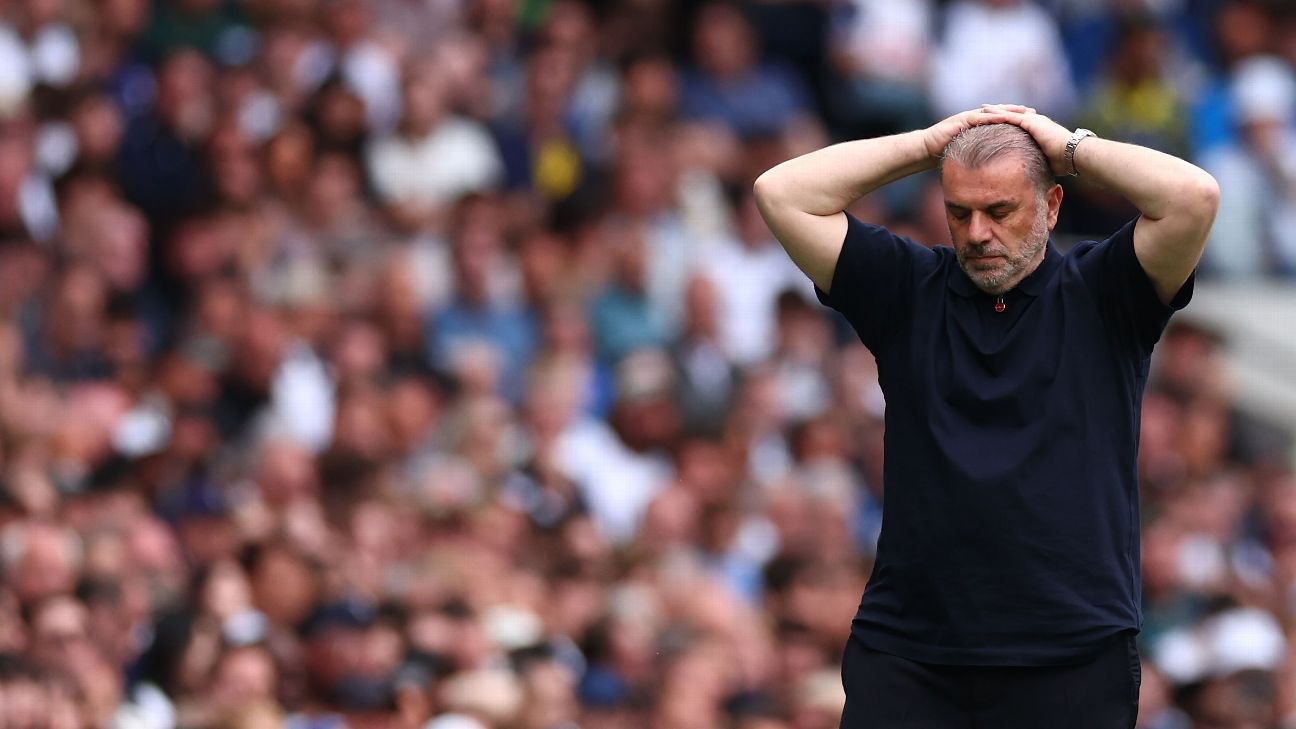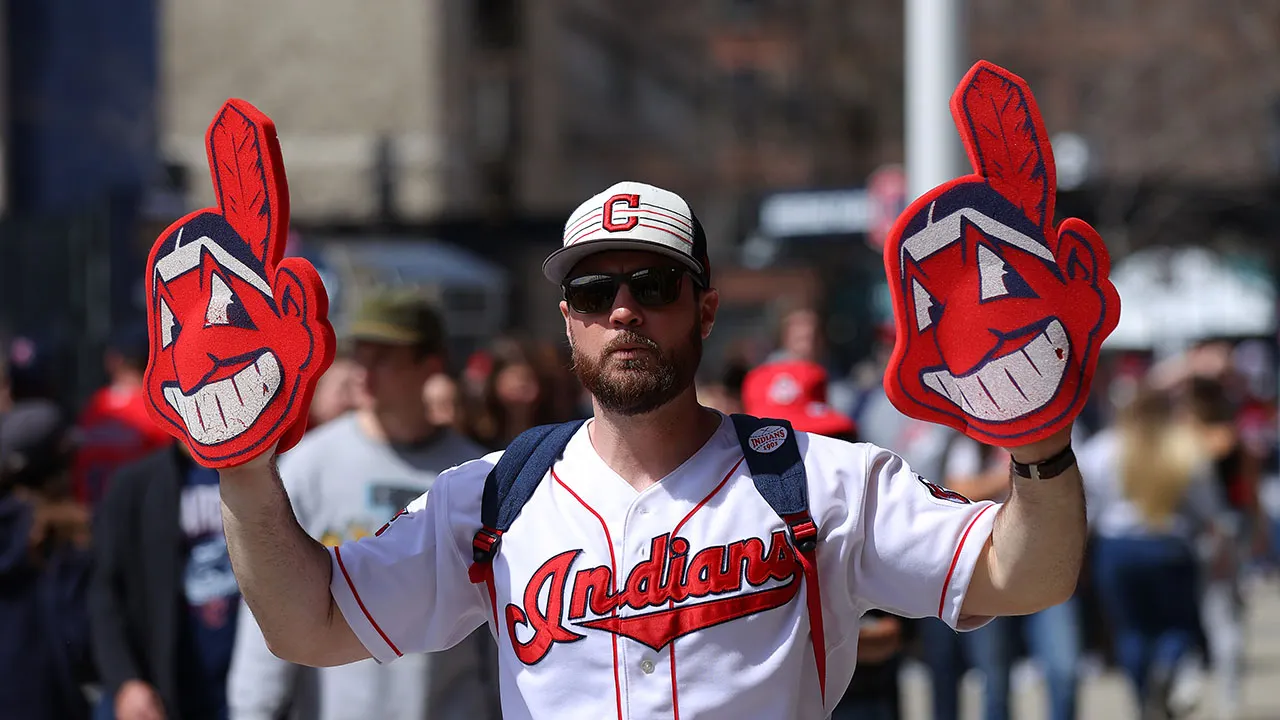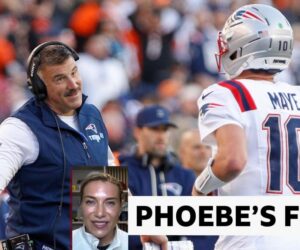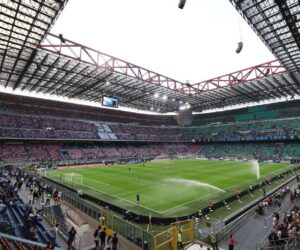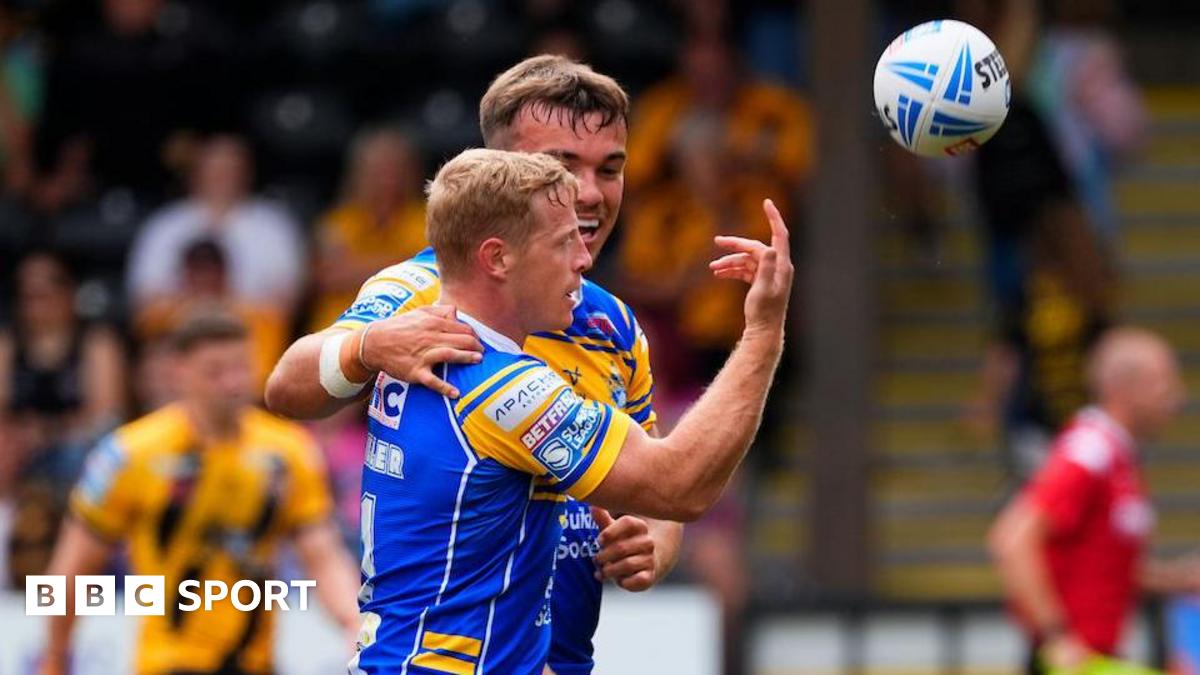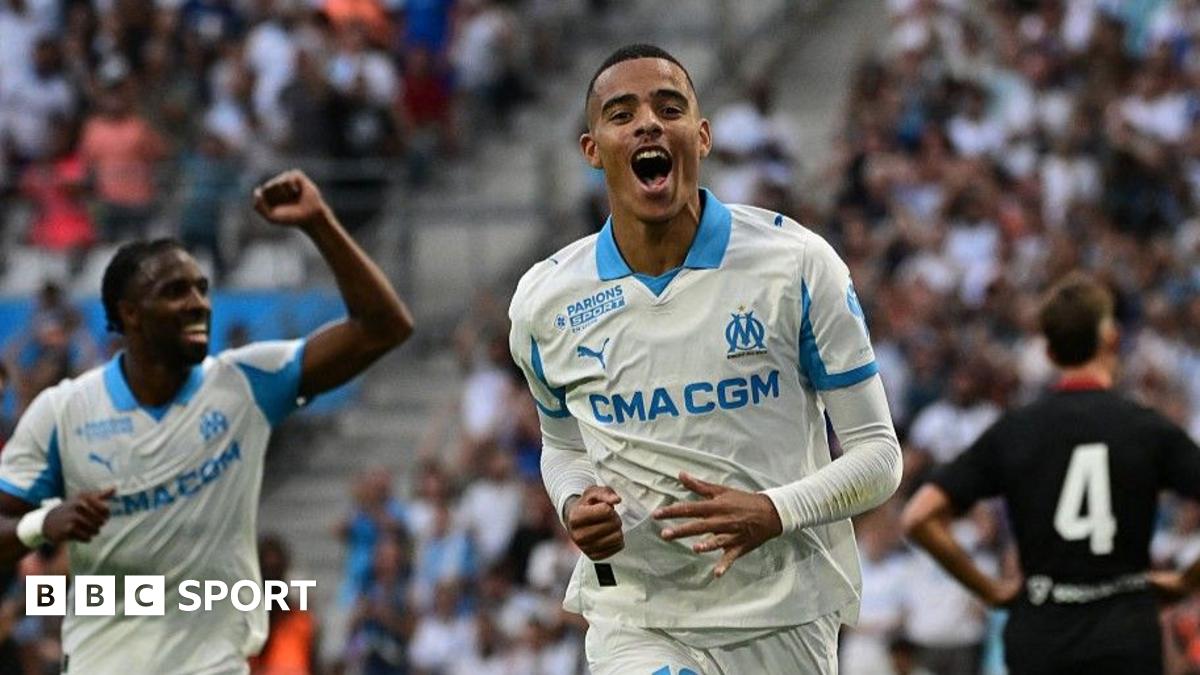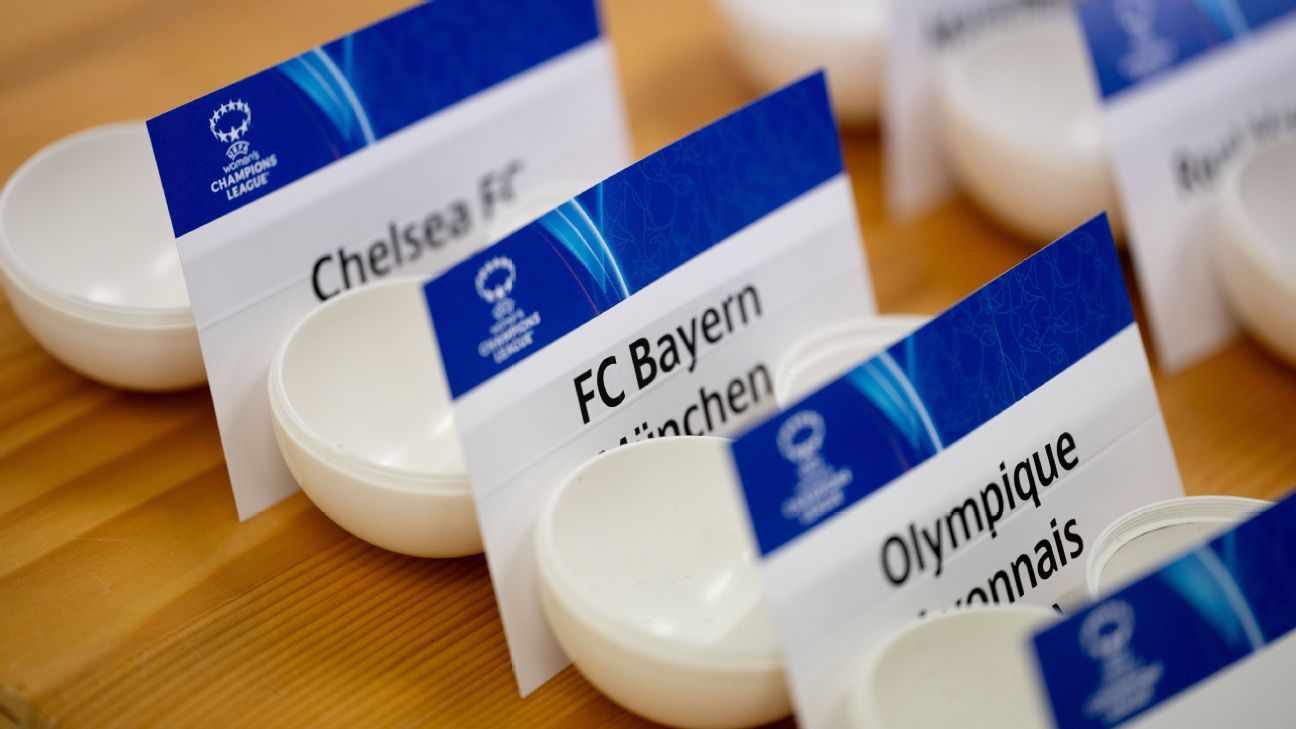It is what it is, mate. Ange Postecoglou was finally put out of his misery Friday as Tottenham Hotspur confirmed what had been an open secret for some time: The 59-year-old had been sacked after a season of tumultuous extremes.
Spurs ended their 17-year wait for a trophy by lifting the UEFA Europa League following a 1-0 win over Manchester United in last month’s final. Postecoglou said all along he would deliver silverware in his second season at the club and, despite widespread ridicule, he did just that, joining Bill Nicholson and Keith Burkinshaw as only the third Tottenham manager to guide them to European glory.
But chairman Daniel Levy and the rest of the board believed it came at too high of a price. Spurs suffered 22 Premier League defeats — a division record for a team not relegated — and finished 17th in the table.
The club statement, when it came, was a mixture of sincere gratitude and pointed fact.
“Following a positive start in the 2023-24 Premier League (PL) season, we recorded 78 points from the last 66 PL games,” it read. “This culminated in our worst-ever PL finish last season.
“At times there were extenuating circumstances — injuries and then a decision to prioritize our European campaign. Whilst winning the Europa League this season ranks as one of the club’s greatest moments, we cannot base our decision on emotions aligned to this triumph.”
And they did not.
Postecoglou’s last public address to supporters from their open-top bus parade defiantly declared that in “all the best TV series, Season 3 is better than Season 2.” Instead, the moneymen pulled the plug.
ESPN looks at how Tottenham came to part company with their history-making head coach.
Fast start
Postecoglou walked into a difficult situation from the outset. On his first day at the club, July 12, 2023, talismanic striker Harry Kane told him he wanted to leave.
Kane eventually departed — a day before the Premier League season started — in a €120 million move to Bayern Munich. Rather than languish in turmoil, though, Spurs shot out of the blocks.
Eight wins and two draws from their opening 10 games put Tottenham atop the Premier League, and the sense of liberation was palpable. A fan base suffocated by the turgid, regressive football of Antonio Conte was suddenly watching a team reborn. Goals, pressing, dynamism and — most importantly — wins. In late September, Levy was sufficiently moved to tell a fans forum that “we’ve got our Tottenham back.”
Postecoglou became the first manager in Premier League history to win three consecutive manager of the month awards at the start of a season.
His first defeat was a remarkable event to witness firsthand. Spurs lost 4-1 at home to Chelsea in the most chaotic of circumstances: two red cards, two injuries, nine VAR checks and 21 minutes of added time. With nine men, Spurs continued to defend on the halfway line in a stark demonstration of their commitment to “Angeball,” and the fans lapped it up.
Mauricio Pochettino, the darling of many Spurs fans after his 5½ years in charge, was in the opposite dugout and watched on as thousands of Tottenham fans greeted full time, not with the boos you might expect, but a reworked rendition of Robbie Williams’ song “Angels,” which declares: “We’re loving Big Ange instead.” The belief was total.
First season finale and second season promise
Spurs were unable to maintain that relentless early-season pace. Two wins from their final seven matches meant they missed out on UEFA Champions League qualification and Postecoglou faced a bizarre situation near the end of the campaign in which many Spurs fans wanted their own team to lose to Manchester City in order to deny Arsenal a Premier League title.
“The foundations are really fragile,” he said after that game May 14. “The last 48 hours have shown me that. It’s inside the club, outside the club.”
Sources say Postecoglou was at least in part referring to the absence of a winning mentality, which he believed permeated the club and contributed to their lack of silverware. It was, he believed, symptomatic of a club that needed to view itself differently, as one that can determine its own destiny rather than have it defined by others.
That belief was in part behind why Postecoglou delivered what turned out to be an iconic line following September’s 1-0 home defeat to Arsenal.
“I’ll correct myself — I don’t usually win things, I always win things in my second year,” he said. Postecoglou bristled at the backlash to that comment but took it upon himself to embody the change he was trying to implement: that Spurs should have the courage of their convictions to believe silverware was within their grasp and not kept beyond some sort of psychological barrier they were perpetually unable to break.
Sources have suggested to ESPN that Postecoglou’s determination to instill that mentality may have contributed to the dogma that followed, believing the only way he could convince those skeptical around him was to double down on his principles: chiefly the commitment to attacking football and a style that increasingly felt incompatible with the hectic demands of English football.
1:21
Why Spurs sacked Ange Postecoglou
Take a look at the stats that explain why Tottenham decided to part with Ange Postecoglou, despite winning the Europa League title.
Injuries and instability
Spurs were rocked around the turn of the year by a devastating injury record.
There were too many cases to mention in full, but key center backs Cristian Romero and Micky van de Ven were sidelined for almost four months. Goalkeeper Guglielmo Vicario was absent for three months. Richarlison was out for two months, twice. Destiny Udogie was out for six weeks at the turn of the year. Dejan Kulusevski, James Maddison and Lucas Bergvall missed the climax of the campaign.
Postecoglou would rue their absences — understandably — but increasingly seemed to separate himself from the situation while sources have told ESPN that some at the club began to question whether his methods were a contributing factor. Some of the injuries were undoubtedly bad luck, but sources say playing a high defensive line, asking players to put in more high-intensity sprints per game, may have played a role in the muscular injuries that followed.
Equally, the club’s sports science and medical departments had been overhauled in the summer of 2024, with head of performance Adam Brett appointed to lead a reshaped structure, but without the success they had hoped for. Sources say the club plan to review their medical team once again following Postecoglou’s departure is further recognition of the issues that remain.
The January window was also a pivotal moment.
Postecoglou openly spoke of the need for reinforcements, but it was only in the final days that Tottenham added an outfield player (Kevin Danso from Lens) in addition to goalkeeper Antonin Kinsky from Slavia Prague. A late loan move for Bayern Munich’s Mathys Tel eventually bolstered their attacking options, but asking a 19-year-old with limited experience — albeit boasting significant potential — to hit the ground running and contribute in a new league midway through the campaign was a tall order.
Postecoglou later revealed that around this time he made the decision to prioritize the Europa League campaign, and not everybody in the club agreed with his call. The Australian simply took the view that Spurs were not well-enough equipped to compete on multiple fronts, and although he would go on to be vindicated in the most emphatic way possible, sources say the Spurs hierarchy fundamentally disagreed with the view that the Premier League campaign had to be sacrificed.
There were also grumblings about Postecoglou’s training methods. Sources say some players voiced concerns about how open the team was in matches and also questioned whether they should do more work focused on specific opponents rather than concentrate on their own game so much. The lack of a specialist set-piece coach became an easy stick to beat him with.
Although clips of Postecoglou clashing with media regularly went viral, he was a usually warm and engaging presence in his pre-match news conferences, always good for a quote and willing to tackle any question put to him. He was refreshingly candid about what he deemed an old-school approach to many topics, most obviously VAR, but the willingness to shun the modern trend for specialist set-piece coaches looked misguided as his team conceded regularly from dead-ball situations.
And sources say rival clubs noted the familiar patterns to the goals Tottenham often conceded, regularly occurring when their full backs were caught out of position high up the pitch as Spurs lost the ball and looked alarmingly vulnerable in transition.
As the league defeats racked up, Postecoglou started to exhibit signs that the pressure of the high stakes, all-or-nothing approach he had created for himself, was beginning to tell. Thinking his team had equalized at Chelsea in early April, Postecoglou cupped his ear to the away fans who had voiced their dissent at his substitutions a few minutes earlier. The goal was disallowed on VAR review and Postecoglou tried to explain away the incident, but few were buying his argument that he had been misinterpreted.
It was the latest in a series of flashpoints with supporters, particularly away from home — he was confronted most vociferously after losing at AFC Bournemouth in December by fans furious at another underwhelming display. Yet inside the dressing room, sources say Postecoglou remained broadly supported. His motivational team talks regularly impressed many within the group and others spoke positively of Postecoglou’s man management.
Sources say he was often distant, deliberately so, allowing his coaches to take training sessions. That was in part designed to give those pre-match addresses maximum impact, and sources suggest his team talk ahead of the Europa League final, which featured a special video including messages to the squad from family members, was one of his very best. He never played favorites but, on occasion, would show his warmer side.
Sources have told ESPN that the new contract Bergvall agreed at the end of April was not triggered by his previous agreement but a desire from within the club to reward the teenager for his efforts to date. Sources say Postecoglou was influential in that decision and spent a lengthy period with the player’s family around the time his contract was announced.
Bilbao and bust
Postecoglou spent the final few weeks of the season talking like a man who knew his time was up, no matter what the outcome of the Europa League final.
Spurs edged a dreadful game in Bilbao with a performance that was the antithesis of “Angeball”: dour, defensive and disciplined. It was, in fact, more in keeping with many of their European performances in the latter stages when beating Eintracht Frankfurt and Bodo/Glimt. Postecoglou had proved he could adapt.
One source questioned whether that was the product of internal pressure demanding change, but either way, Postecoglou delivered one of the greatest nights in the club’s history. And he did so by fostering a togetherness that endured despite a wretched domestic campaign.
In the aftermath of victory, Postecoglou admitted he had no idea about his future, signing off his final news conference and a question about whether he wanted clarity with “que sera, sera” and insisting he could hold his head up high no matter what the verdict.
The chance to celebrate with more than 200,000 Spurs fans who lined the streets of north London for a trophy parade will, in time if it hasn’t already, cement his status as a manager who delivered the most memorable moment Spurs have enjoyed in 17 years. Whatever the divisions that exist within the fanbase now, he will likely be cheered whenever he does return.
And yet, Levy felt the success came at too big a cost. Once the last of the ticker tape fell to the floor, the view was taken that Postecoglou’s high-risk style could not deliver the sort of sustained success that Tottenham have long craved.
For years, the Spurs hierarchy have faced accusations of lacking the hunger to win trophies, of compromising the football for the finances or greater pragmatism. Inadvertently, Postecoglou ended up distilling this question down to the starkest terms of all: after almost two decades without any silverware, would you sacrifice an entire league campaign to win a trophy?
The answer, it turns out, is, Thank you for a glorious night, but no.

